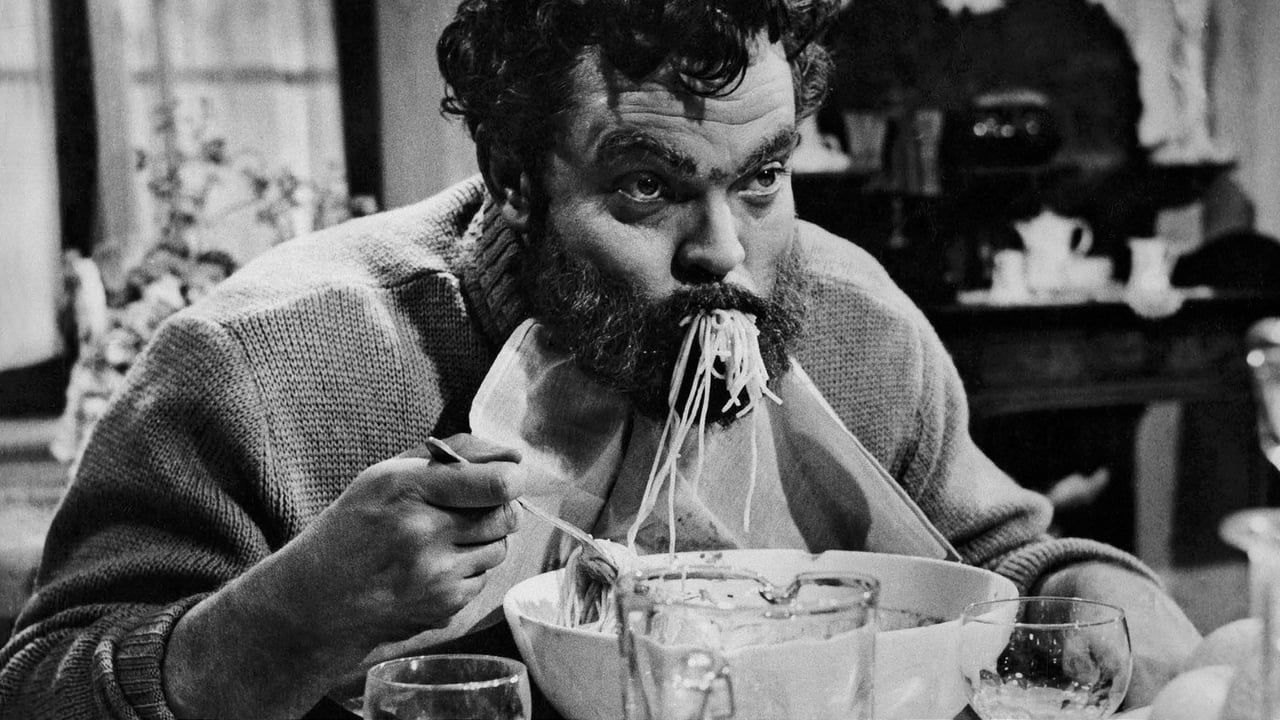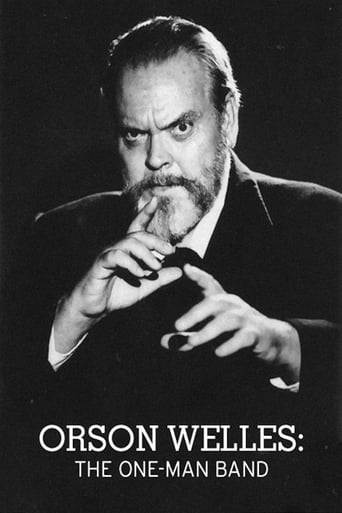Doomtomylo
a film so unique, intoxicating and bizarre that it not only demands another viewing, but is also forgivable as a satirical comedy where the jokes eventually take the back seat.
Murphy Howard
I enjoyed watching this film and would recommend other to give it a try , (as I am) but this movie, although enjoyable to watch due to the better than average acting fails to add anything new to its storyline that is all too familiar to these types of movies.
Raymond Sierra
The film may be flawed, but its message is not.
Phillida
Let me be very fair here, this is not the best movie in my opinion. But, this movie is fun, it has purpose and is very enjoyable to watch.
Hollywoodshack
Gary Graver and Oja Kodar were Orson Welles' constant companions during the last years of his life. Graver was his photography director for American films and Kodar was his live in girlfriend. In One Man Band, the focus is usually on the films Oja performed in. The secondary message seems to be Oja wants fame and recognition because she was Welles' lover and wants to use him as a stepping stone to promote her own success. Shown is an extended promo for F for Fake where Oja is prancing about semi nude or in sexy clothes every minute of the ten minutes or so of the rejected trailer. The film in fact was a boring comparison of a famous art forger and Clifford Irving who faked Howard Hughes' biography. My main disappointment is that more of Welles' legendary unfinished film was not shown, The Other Side of the Wind. The scene shown is a short semi nude clip featuring Oja again. Gary Graver was said to have a complete working print of the movie, but his documentary featured little or nothing from it at all. A truckload of films are retrieved, but Oja claims to have just a few scenes. This is very hard for me to believe, indeed. A complete film from either Graver or Kadar kept separately from the negative stored in a vault in France seems to have vanished.
tavm
After watching Orson Welles' first film, the experimental short The Hearts of Age, on UbuWeb, I decided to see the other one under his name there called Orson Welles: The One-Man Band. This documentary was directed by Vassili Silovic with the cooperation of Oja Kodar who takes us through her and Orson's house in search of his unfinished films and other stray materials. Among the most fascinating of those: scenes of The Other Side of the Wind like that of a female reporter interviewing a narcissistic director played by John Huston and his associate played by Peter Bogdanovich or a car scene with a young woman making love to a young man while the driver is being nonchalant through it all, Welles doing a monologue of reading "Moby Dick", and scenes of The Dreamers featuring compelling turns by both Ms. Kodar and Welles. There's also some funny scenes like that of Welles portraying Winston Churchill or the rejected F for Fake trailer where he claims his "War of the Worlds" radio broadcast wasn't a hoax after all! And then there's his acceptance speech at the American Film Institute honors, his performing with Muppets, and some partially funny moments from his Londan-based endeavors that were also fascinating to watch. There's others I haven't mentioned but I'll just say I heartily recommend Orson Welles: The One-Man Band for any of his enthusiasts out there. P.S. I recognized Charles Gray on The Merchant of Venice clips from his work in The Rocky Horror Picture Show and the Bond films, You Only Live Twice and Diamonds Are Forever.
MisterWhiplash
Orson Welles fans, this may be the best you'll get in terms of 'lock-box' finished films from the prolific, perpetually f***ed over father of maverick-style cinema (i.e. few films made in Hollywood, with Europe his only safe place for his very independent ways as an actor/writer/director/producer/editor). Like an author who's smaller, in-the-vault kinds of works put together by an editor into one compilation, One Man Band, like the documentary It's All True, is a sort of collector's item in and of itself. Along with giving the fullest possible glimpses (as far as we Welles fans know) of the films as part of Welles's un-official scrapbook, there are some revelatory insights from his longtime companion Oja Kodar, and clips from a public interview in an auditorium (a very funny one) that shines some light on a couple of issues. The director here is the editor, assembling the pieces at times in the essay style of F for Fake (and this film is now included with it on the brilliantly packaged Criterion DVD), though not as frantic in style and purpose.Here we get something very special, in spurts, and even when the interest is a little more low-key than expected (though fun, the novelty isn't exceptional of Welles reading excerpts from Moby Dick and The Merchant of Venice), one can't look away. The best parts include the intact scenes from the Deep, London, the filmed excerpts of Merchant of Venice, the little moments of Welles's odd, hilarious imitations, and the one that still could be completed, the Other Side of the Wind. That last film is maybe the most fascinating film of the lot, as it goes even further with montage and experimental style than F for Fake. It's wild, it's rambling, and I could only get an idea of what was going on, but that's all I could've asked for anyway. The veneer of Welles's personality, as well, is stripped a bit away through Kodar's insights, how he was more of a modest man than the overwhelming, megalomaniac personality people made him out to be. At the end of the day he was, as the film makes clear without a shadow of doubt, one of the true poets of 20th century cinema, and like other controversial artists his major works were practically all censored, while the minor works barely left his traveling-alongside film cans.To see a filmmaker at work, at least in retrospective, can be many things, from dull, to over-indulgent, to really passing all of that and showing a man at work. While there isn't footage of Welles at work on a set like with Ingmar Bergman Makes a Movie or A.K., the footage here compensates for that. One can see through the little bits of film done, the ones that showed his determination to keep rolling along instead of getting stuck in the past, that it isn't too much of a surprise that he got a little sick of people tipping the hat to Citizen Kane and nothing else he did in his career. His story is one of the tragedies of the artist's world, though it's good to know that he never got too depressed to not quit at the magic and voices. It's a real treat.
didi-5
A hugely enjoyable look at the films that were never completed by Hollywood's infant terrible, Orson Welles - while he was appearing in second-rate films (or taking tiny cameos in good films) he was chasing his dreams of making films like Moby Dick, The Merchant of Venice, and others.Here we see clips of what is left and see how the failed projects developed, grew, and ran out of money. We also see surprisingly funny stuff such as the One-Man Band segment, alongside more serious stuff like The Other Side of the Wind.As well as his lost work, this film gives an opportunity to bring sundry TV appearances together - Orson with the Muppets, doing magic tricks and recitations, and so on.

